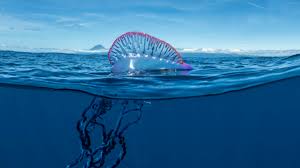How to Avoid the Portuguese Man-of-War
This time of year briings the The Portuguese man-of-war to the water around Key West. Often mistaken for a jellyfish, it’s a beautiful but potentially dangerous marine creature found in warm ocean waters around the world. With its distinctive blue or purple float and long, venomous tentacles, it can deliver a painful sting to unsuspecting swimmers and beachgoers. Here’s how you can avoid encounters with the Portuguese man-of-war and what to do if you get stung.
the Portuguese Man-of-War
Before delving into prevention and treatment, it’s important to understand what the Portuguese man-of-war is. Despite its jellyfish-like appearance, it’s actually a siphonophore, a colonial organism made up of specialized individual animals called zooids. The float is filled with gas, which allows it to drift on the ocean’s surface, while its tentacles, which can extend up to 30 feet, contain stinging cells used to capture prey.
How to Avoid Encounters
Staying away from Portuguese man-of-war in open water requires a combination of vigilance, precaution, and awareness. Here are some tips to help you avoid these potentially dangerous creatures while swimming or engaging in water activities:
Stay Informed: Before heading out, check local reports or speak with lifeguards about recent sightings of Portuguese man-of-war in the area. Awareness of their presence can help you make informed decisions about where and when to swim.
Wear Protective Clothing: If you’re planning to swim or dive in an area where Portuguese man-of-war are known to be present, consider wearing a protective wetsuit or rash guard. This can provide a barrier between your skin and their stinging tentacles.
Keep a Lookout: While in the water, keep an eye on the surface for the distinctive floats of the Portuguese man-of-war. Their bright colors are usually visible from a distance, allowing you to steer clear.
Swim with a Buddy: Always swim with a partner when in open water. Not only is it safer in general, but you can also help each other spot potential hazards like Portuguese man-of-war.
Avoid Areas with Prevailing Onshore Winds: Portuguese man-of-war are often blown toward shore by onshore winds. Swimming in areas with offshore winds or in protected bays can reduce your chances of encountering them.
Be Cautious After Storms: Storms and strong winds can push Portuguese man-of-war closer to shore and into swimming areas. Be extra cautious and check for warnings after such weather events.
Check Beach Flags and Weather Warnings: Many beaches in areas where Portuguese man-of-wars are common will display warning flags or signs when they are spotted in the water or washed up on the beach. Pay attention to these weather warnings and avoid entering the water when they are present.
Look Out for Them: When on the water, keep an eye out for Portuguese man-of-wars. They are often easy to spot due to their bright colors and distinctive float. If you see one, stay away and alert others to its presence.
Avoid Touching Them: Even if a Portuguese man-of-war is washed up on the beach and appears dead, its tentacles can still sting. Avoid touching or stepping on them, and keep pets away as well.
What to Do If You Get Stung
Get Out of the Water: If you are stung, exit the water calmly and as quickly as possible to avoid further stings.
Rinse with Vinegar or Saltwater: Rinse the affected area with vinegar or saltwater to neutralize the stinging cells. Avoid using fresh water, as it can cause the cells to release more venom.
Remove Tentacles Carefully: If there are tentacles still attached to your skin, carefully remove them using a pair of tweezers or the edge of a credit card. Avoid rubbing the area, as this can cause more venom to be released.
Apply Heat: Applying heat to the affected area can help reduce pain and inactivate the venom. Use a hot pack or immerse the area in hot water (not scalding) for about 20 minutes.
Seek Medical Attention: If the pain is severe, the sting covers a large area, or you experience symptoms such as difficulty breathing, chest pain, or a severe allergic reaction, seek medical attention immediately.
By staying vigilant and following these guidelines, you can enjoy diving or snorkeling while minimizing the risk of a painful encounter with a Portuguese man-of-war.



